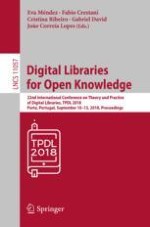2018 | Buch
Digital Libraries for Open Knowledge
22nd International Conference on Theory and Practice of Digital Libraries, TPDL 2018, Porto, Portugal, September 10–13, 2018, Proceedings
herausgegeben von: Eva Méndez, Fabio Crestani, Cristina Ribeiro, Gabriel David, João Correia Lopes
Verlag: Springer International Publishing
Buchreihe : Lecture Notes in Computer Science
